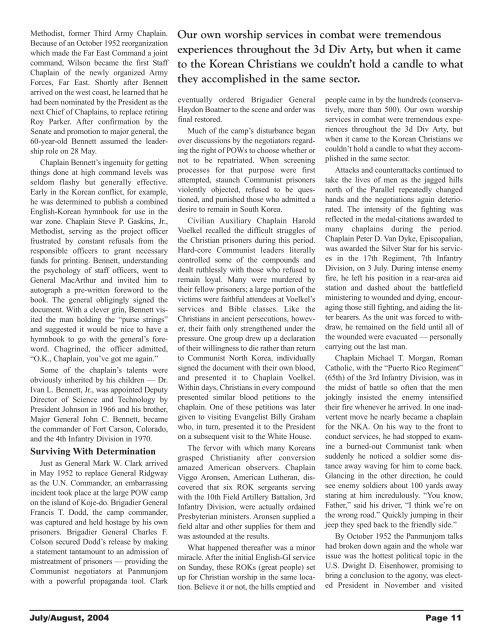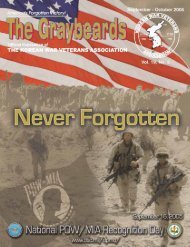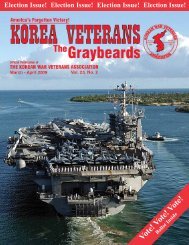The Graybeards - KWVA - Korean War Veterans Association
The Graybeards - KWVA - Korean War Veterans Association
The Graybeards - KWVA - Korean War Veterans Association
Create successful ePaper yourself
Turn your PDF publications into a flip-book with our unique Google optimized e-Paper software.
Methodist, former Third Army Chaplain.<br />
Because of an October 1952 reorganization<br />
which made the Far East Command a joint<br />
command, Wilson became the first Staff<br />
Chaplain of the newly organized Army<br />
Forces, Far East. Shortly after Bennett<br />
arrived on the west coast, he learned that he<br />
had been nominated by the President as the<br />
next Chief of Chaplains, to replace retiring<br />
Roy Parker. After confirmation by the<br />
Senate and promotion to major general, the<br />
60-year-old Bennett assumed the leadership<br />
role on 28 May.<br />
Chaplain Bennett’s ingenuity for getting<br />
things done at high command levels was<br />
seldom flashy but generally effective.<br />
Early in the <strong>Korean</strong> conflict, for example,<br />
he was determined to publish a combined<br />
English-<strong>Korean</strong> hymnbook for use in the<br />
war zone. Chaplain Steve P. Gaskins, Jr.,<br />
Methodist, serving as the project officer<br />
frustrated by constant refusals from the<br />
responsible officers to grant necessary<br />
funds for printing. Bennett, understanding<br />
the psychology of staff officers, went to<br />
General MacArthur and invited him to<br />
autograph a pre-written foreword to the<br />
book. <strong>The</strong> general obligingly signed the<br />
document. With a clever grin, Bennett visited<br />
the man holding the “purse strings”<br />
and suggested it would be nice to have a<br />
hymnbook to go with the general’s foreword.<br />
Chagrined, the officer admitted,<br />
“O.K., Chaplain, you’ve got me again.”<br />
Some of the chaplain’s talents were<br />
obviously inherited by his children — Dr.<br />
Ivan L. Bennett, Jr., was appointed Deputy<br />
Director of Science and Technology by<br />
President Johnson in 1966 and his brother,<br />
Major General John C. Bennett, became<br />
the commander of Fort Carson, Colorado,<br />
and the 4th Infantry Division in 1970.<br />
Surviving With Determination<br />
Just as General Mark W. Clark arrived<br />
in May 1952 to replace General Ridgway<br />
as the U.N. Commander, an embarrassing<br />
incident took place at the large POW camp<br />
on the island of Koje-do. Brigadier General<br />
Francis T. Dodd, the camp commander,<br />
was captured and held hostage by his own<br />
prisoners. Brigadier General Charles F.<br />
Colson secured Dodd’s release by making<br />
a statement tantamount to an admission of<br />
mistreatment of prisoners — providing the<br />
Communist negotiators at Panmunjom<br />
with a powerful propaganda tool. Clark<br />
Our own worship services in combat were tremendous<br />
experiences throughout the 3d Div Arty, but when it came<br />
to the <strong>Korean</strong> Christians we couldn’t hold a candle to what<br />
they accomplished in the same sector.<br />
eventually ordered Brigadier General<br />
Haydon Boatner to the scene and order was<br />
final restored.<br />
Much of the camp’s disturbance began<br />
over discussions by the negotiators regarding<br />
the right of POWs to choose whether or<br />
not to be repatriated. When screening<br />
processes for that purpose were first<br />
attempted, staunch Communist prisoners<br />
violently objected, refused to be questioned,<br />
and punished those who admitted a<br />
desire to remain in South Korea.<br />
Civilian Auxiliary Chaplain Harold<br />
Voelkel recalled the difficult struggles of<br />
the Christian prisoners during this period.<br />
Hard-core Communist leaders literally<br />
controlled some of the compounds and<br />
dealt ruthlessly with those who refused to<br />
remain loyal. Many were murdered by<br />
their fellow prisoners; a large portion of the<br />
victims were faithful attendees at Voelkel’s<br />
services and Bible classes. Like the<br />
Christians in ancient persecutions, however,<br />
their faith only strengthened under the<br />
pressure. One group drew up a declaration<br />
of their willingness to die rather than return<br />
to Communist North Korea, individually<br />
signed the document with their own blood,<br />
and presented it to Chaplain Voelkel.<br />
Within days, Christians in every compound<br />
presented similar blood petitions to the<br />
chaplain. One of these petitions was later<br />
given to visiting Evangelist Billy Graham<br />
who, in turn, presented it to the President<br />
on a subsequent visit to the White House.<br />
<strong>The</strong> fervor with which many <strong>Korean</strong>s<br />
grasped Christianity after conversion<br />
amazed American observers. Chaplain<br />
Viggo Aronsen, American Lutheran, discovered<br />
that six ROK sergeants serving<br />
with the 10th Field Artillery Battalion, 3rd<br />
Infantry Division, were actually ordained<br />
Presbyterian ministers. Aronsen supplied a<br />
field altar and other supplies for them and<br />
was astounded at the results.<br />
What happened thereafter was a minor<br />
miracle. After the initial English-GI service<br />
on Sunday, these ROKs (great people) set<br />
up for Christian worship in the same location.<br />
Believe it or not, the hills emptied and<br />
people came in by the hundreds (conservatively,<br />
more than 500). Our own worship<br />
services in combat were tremendous experiences<br />
throughout the 3d Div Arty, but<br />
when it came to the <strong>Korean</strong> Christians we<br />
couldn’t hold a candle to what they accomplished<br />
in the same sector.<br />
Attacks and counterattacks continued to<br />
take the lives of men as the jagged hills<br />
north of the Parallel repeatedly changed<br />
hands and the negotiations again deteriorated.<br />
<strong>The</strong> intensity of the fighting was<br />
reflected in the medal-citations awarded to<br />
many chaplains during the period.<br />
Chaplain Peter D. Van Dyke, Episcopalian,<br />
was awarded the Silver Star for his services<br />
in the 17th Regiment, 7th Infantry<br />
Division, on 3 July. During intense enemy<br />
fire, he left his position in a rear-area aid<br />
station and dashed about the battlefield<br />
ministering to wounded and dying, encouraging<br />
those still fighting, and aiding the litter<br />
bearers. As the unit was forced to withdraw,<br />
he remained on the field until all of<br />
the wounded were evacuated — personally<br />
carrying out the last man.<br />
Chaplain Michael T. Morgan, Roman<br />
Catholic, with the “Puerto Rico Regiment”<br />
(65th) of the 3rd Infantry Division, was in<br />
the midst of battle so often that the men<br />
jokingly insisted the enemy intensified<br />
their fire whenever he arrived. In one inadvertent<br />
move he nearly became a chaplain<br />
for the NKA. On his way to the front to<br />
conduct services, he had stopped to examine<br />
a burned-out Communist tank when<br />
suddenly he noticed a soldier some distance<br />
away waving for him to come back.<br />
Glancing in the other direction, he could<br />
see enemy soldiers about 100 yards away<br />
staring at him incredulously. “You know,<br />
Father,” said his driver, “I think we’re on<br />
the wrong road.” Quickly jumping in their<br />
jeep they sped back to the friendly side.”<br />
By October 1952 the Panmunjom talks<br />
had broken down again and the whole war<br />
issue was the hottest political topic in the<br />
U.S. Dwight D. Eisenhower, promising to<br />
bring a conclusion to the agony, was elected<br />
President in November and visited<br />
July/August, 2004 Page 11

















